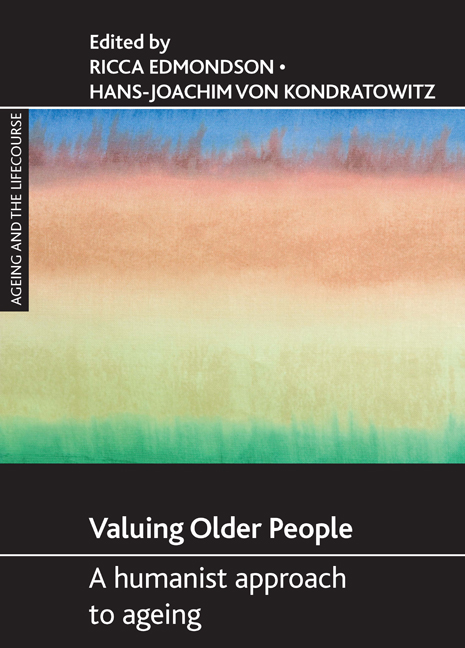Book contents
- Frontmatter
- Contents
- List of tables and figures
- Notes on contributors
- Acknowledgements
- Foreword
- Introduction
- Part One Religion, spirituality, cultural resources and creating meaning
- Part Two Norms, values and gerontology
- Part Three Ageing and wisdom? Conflicts and contested developments
- Afterwords
- Index
- Available titles in the Ageing and the Lifecourse series
thirteen - ‘Woo-hoo, what a ride!’ Older people, life stories and active ageing
Published online by Cambridge University Press: 05 July 2022
- Frontmatter
- Contents
- List of tables and figures
- Notes on contributors
- Acknowledgements
- Foreword
- Introduction
- Part One Religion, spirituality, cultural resources and creating meaning
- Part Two Norms, values and gerontology
- Part Three Ageing and wisdom? Conflicts and contested developments
- Afterwords
- Index
- Available titles in the Ageing and the Lifecourse series
Summary
Introduction
A popular email is currently being widely circulated:
Life should NOT be a journey to the grave with the intention of arriving safely in an attractive and well preserved body, but rather to skid in sideways, chocolate in one hand, wine in the other, body thoroughly used up, totally worn out and screaming ‘WOO-HOO what a ride!’
What is appealing about this message is its explicit lay challenge to exhortations towards active and healthy ageing: looking after yourself is all fine and good, but what is more important is to indulge and have fun. Of course, few of us live our later lives in terms of this either/or choice. Most of us would like to think that we work at both. Neither is our journey to the grave unaccompanied, but is influenced by those we travel with or meet along the way. Nevertheless, policy echoes both the individualistic focus and the implied dichotomy (Kemp and Denton, 2003), only this time without the fun. The opposite of ‘active’ and ‘healthy’ ageing in later life is seen as a negative dependency.
This chapter develops further our exploration of the notion of active ageing, questioning the limited understanding of this central concept in current policy and research on ageing (ESRC, no date: 2). Elsewhere (Clarke and Warren, 2007), we argue that older people experience active ageing in a diversity of ways, both shared and unique, that are not necessarily captured in existing research, showing how active ageing is important to looking ahead beyond retirement, as well as being understood in terms of people's pasts. This chapter focuses on understanding active ageing as a relational experience. It is based on Clarke's series of biographical interviews with older people, central to which is the belief that to understand ageing we have to examine older people's experiences in the much broader context of their lives (Clarke, 2001). Here we demonstrate that, whether we go for ‘attractive and well preserved’ or ‘worn out and screaming’, choices we make about activity in later life are influenced, and sometimes constrained, by a sense of freedom. But they also place value on participation in wider society.
- Type
- Chapter
- Information
- Valuing Older PeopleA Humanist Approach to Ageing, pp. 233 - 248Publisher: Bristol University PressPrint publication year: 2009



